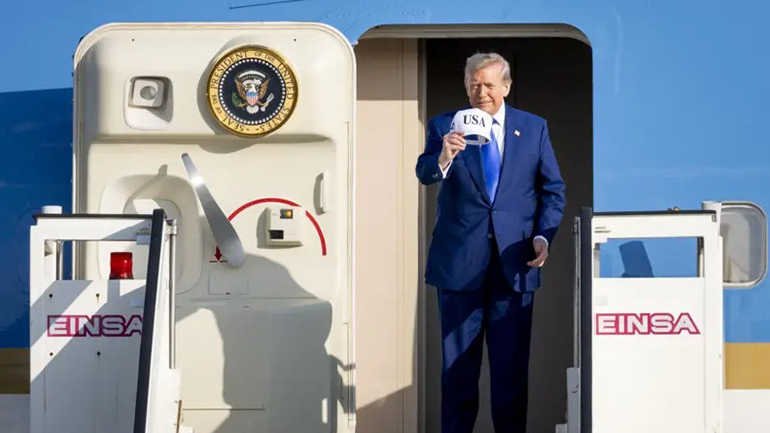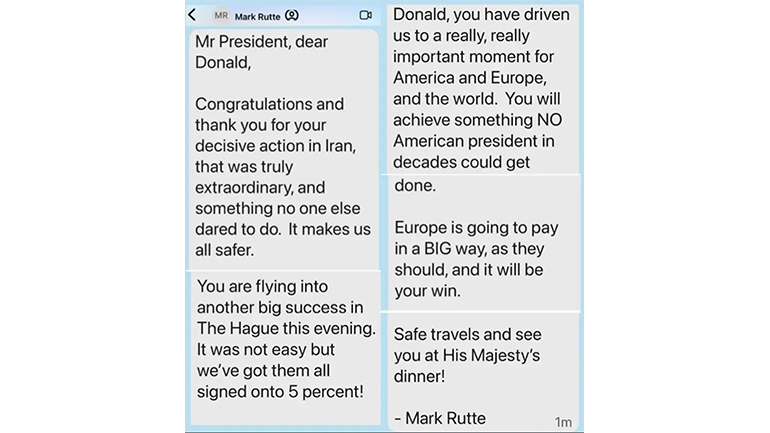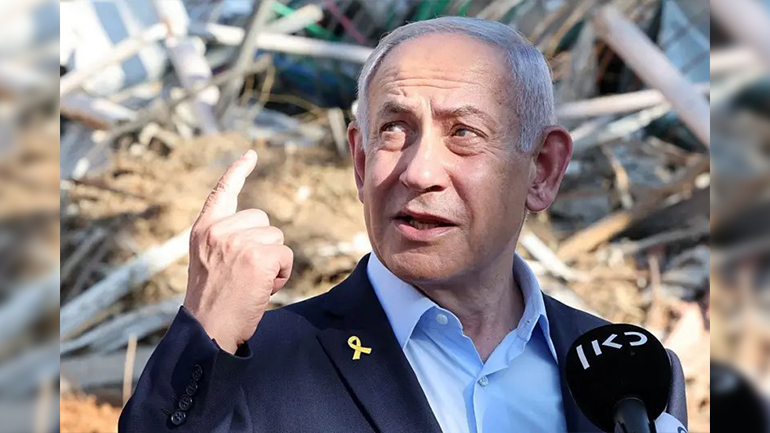

Aboard Air Force One, en route to the NATO Summit in the Netherlands, President Donald Trump shared a surprising message on social media—this time from an unexpected source. The message came from NATO Secretary General Mark Rutte, who praised Trump for the successful U.S. bomber attack on Iranian nuclear facilities. Trump posted Rutte’s message on his Truth Social account, which read: “Thank you and congratulations for taking decisive action against Iran. This was undoubtedly extraordinary and a move that no one before you dared to make.” Trump has had a history of tensions with NATO, particularly over the alliance’s collective defense commitments and member nations' defense spending. In his message, Rutte also acknowledged this issue and added that Trump was “heading toward another great victory” as NATO members agreed to spend 5% of their GDP on defense, fulfilling Trump’s long-standing demand.

The United States attacked Iran's nuclear facilities on Saturday night, but by Tuesday morning, President Trump had left Washington for another international trip.
These enthusiastic words—and President Trump’s eagerness to share them with the world—highlight how much the Middle East diplomacy and U.S. foreign policy have shifted for him. Just last week, Trump left the G7 Summit in Canada a day early, as the Israel-Iran conflict was escalating, raising concerns that the United States could enter the war. The U.S. airstrikes on Iran’s nuclear facilities took place Saturday night, but by Tuesday morning, President Trump had already departed Washington for another international diplomatic mission. This time, a fragile ceasefire agreement had been established between the warring sides. The message from NATO Secretary General Mark Rutte—confirmed by NATO’s press office to the BBC—aligned with the White House narrative that framed the strikes as decisive and historic. According to this narrative, Trump’s military action neutralized the threat of Iranian nuclear weapons, paved the way for a ceasefire, and brought an end to the so-called “12-day war.” Trump’s pressure and personal diplomacy—including an “straightforward call” from Air Force One to Israeli Prime Minister Benjamin Netanyahu, as noted by the White House—are credited with helping secure the ceasefire.
"This will be your victory," he wrote.

Messages sent to Trump by NATO chief
Last week, U.S. allies appeared deeply concerned, but now it seems that President Donald Trump is touring Europe to receive praise for his actions. However, the situation is far more complex. While the White House claims that the U.S. airstrikes destroyed Iran’s nuclear facilities, American military intelligence officials have told U.S. media that the damage isn’t as severe as the administration suggests. According to Pentagon intelligence assessments, Iran’s nuclear program has only been set back by a few months. Sources familiar with the report said that Iran’s enriched uranium stockpile was not eliminated in the attacks. Questions remain about how much enriched uranium Iran still has and where it is stored, as it constitutes a critical component of any potential nuclear weapon. There are also reports suggesting the existence of a secret Iranian facility that escaped damage during the strikes. While the currency and the country’s future remain uncertain. Syria offers a cautionary tale: when authoritarian control faltered, chaos ensued. President Trump has spoken of providing “love, peace, and prosperity” to Iran, but regional instability and crisis remain very real possibilities. Although Trump has seemingly halted the Israel-Iran war, the conflicts he once vowed to end—like those in Gaza and Ukraine—are still ongoing. For now, these concerns appear to be off the White House agenda.

The White House says the ceasefire was made possible by an "unusually direct phone call" from Trump to Israeli Prime Minister Benjamin Netanyahu from Air Force One.
At present, Trump’s domestic critics—who had previously condemned his Iran strikes—have largely fallen silent. Among them was Republican lawmaker Thomas Massie, who had planned to introduce a resolution to limit Trump’s use of force in Iran but has now withdrawn it. This has given Trump the political space to celebrate what he sees as a foreign policy success. On Tuesday, Vice President J.D. Vance posted on Truth Social outlining what he called Trump’s foreign policy doctrine, which, according to him, has three core principles:
A clear definition of American interests,
Aggressively negotiating to achieve those interests,
Using military force when necessary.
When it comes to foreign policy doctrines, there may not be much more to glean. The president’s international strategy often feels reactive and contradictory—more like military improvisation than a coherent strategic vision. Whether it’s about imposing or lifting tariffs, or negotiating with allies and adversaries, Trump’s approach has lacked consistency. Over the past two weeks, Trump initially distanced himself from Israel’s attacks on Iran, only to later intervene in the conflict. Similarly, he first demanded Iran's unconditional surrender and then agreed to a ceasefire under vague terms. He talked about regime change, only to downplay it later. It has been an extraordinary rollercoaster of foreign policy, where derailment seemed possible at every turn. Yet, somehow, results have materialized. And for Trump, this week ended with a rare moment of triumph.
Powered by Froala Editor